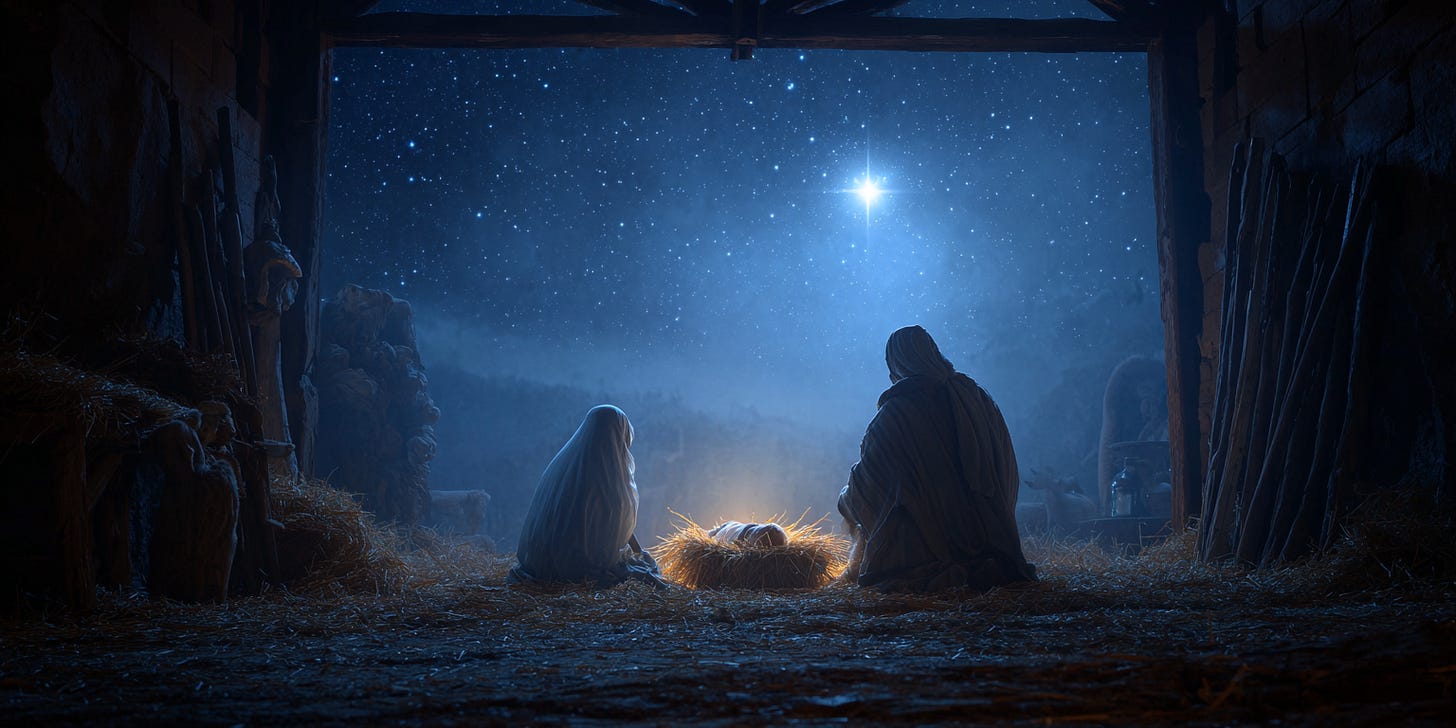Week 25: The Birth of the Messiah
Jesus' Arrival as the Fulfillment of God’s Promises
Theme: The birth of the Messiah is not merely the beginning of the Gospel of Matthew but the manifestation of God’s eternal purpose to reconcile humanity to Himself through covenantal fidelity and divine incarnation. Through genealogies, fulfilled prophecies, and divine interventions, the narrative unveils the mystery of God becoming flesh—entering history as a vulnerable infant to redeem all creation. This theme reminds us that the incarnation was the long-anticipated convergence of divine justice and mercy, where heaven kissed earth and the ancient promises to Abraham and David found their living fulfillment in Jesus Christ.
Objectives:
Understand the significance of Jesus’ genealogy and His birth as the fulfillment of God’s promises to Abraham and David.
Reflect on the events surrounding Jesus’ birth and how they reveal God’s sovereignty and faithfulness.
Explore the prophetic nature of Jesus’ birth and its implications for God’s redemptive plan.
Scripture Focus:
Introduction
In the opening chapters of Matthew, the genealogy and nativity of Jesus Christ are presented not as arbitrary details, but as critical elements in God's redemptive narrative. These events ground the Messiah in historical and prophetic reality, affirming that God's covenantal promises have found their fulfillment in the person of Jesus.
Jesus’ Genealogy: The Fulfillment of Covenants (Matthew 1:1-17)
The genealogy of Jesus Christ ties Him directly to Abraham and David, signifying the fulfillment of the promises made to both patriarchs. This lineage is not merely biological; it is theological, emphasizing Jesus as the long-awaited seed through whom all nations would be blessed (Genesis 12:3) and the eternal king from David's line (2 Samuel 7:12-13). The inclusion of women like Tamar, Rahab, Ruth, and Bathsheba—many of whom were Gentiles or had morally complex stories—underscores the redemptive scope of God's grace. Jesus embodies both the heritage of Israel and the hope for all nations.
The Birth of Jesus: God with Us (Matthew 1:18-25)
Jesus' conception by the Holy Spirit and His designation as Immanuel affirm His divine origin and mission. This miraculous event fulfills the prophecy of Isaiah 7:14, revealing God’s intent to dwell with humanity. Joseph’s decision to obey the angel’s command, despite societal norms and personal risk, illustrates the kind of faith and obedience that aligns with divine purposes. Through Jesus, God's presence is no longer distant but intimately present.
The Visit of the Magi: God’s Sovereignty in Jesus’ Early Life (Matthew 2:1-12)
The Magi's journey from the East, guided by divine revelation, points to the universal kingship of Jesus. Their homage fulfills Micah 5:2, affirming Jesus as the ruler born in Bethlehem. The contrast between the Magi’s worship and Herod’s fear reveals the divisive nature of Christ's coming. His birth draws both reverence and rebellion, echoing the cosmic tension between light and darkness.
The Flight to Egypt and Return (Matthew 2:13-23)
God's protective hand over Jesus is evident as Joseph obeys divine instructions, fleeing to Egypt and later returning to Nazareth. Each movement fulfills prophecy: the sojourn in Egypt (Hosea 11:1), the massacre in Bethlehem (Jeremiah 31:15), and the settlement in Nazareth (Isaiah 11:1). These events declare God’s sovereignty and the meticulous orchestration of His redemptive plan, despite human evil.
Relational Christianity and Identity in Christ:
God's inclusion of flawed and foreign individuals in Jesus' lineage emphasizes the reach of His love and grace. Jesus' birth as Immanuel reveals a God who draws near, inviting us into intimate relationship and restored identity.
Apologetics and the Defense of Faith:
The historical and prophetic accuracy of Jesus’ genealogy and early life affirm the credibility of Scripture. Fulfilled prophecies provide a solid foundation for faith and a compelling case for the Messiah's divine origin.
Humanity’s Cosmic Role and Redemption:
The Magi’s journey reflects the global scope of redemption. Jesus’ arrival is not just for Israel but for all nations, pointing to humanity’s restored place in God’s cosmic plan.
Biblical Theology and the Supernatural Worldview:
Each supernatural element—from angelic visitations to prophetic fulfillment—reinforces a worldview where God is actively shaping history. These events bridge heaven and earth in the person of Christ.
Exploring Key Themes
Faithfulness of God: The genealogical record and prophetic fulfillments declare a God who keeps His promises.
The Global Gospel: Jesus’ birth draws in both Jews and Gentiles, showing God's intent to redeem all humanity.
Divine Intervention: The narrative is saturated with supernatural guidance, underscoring God's involvement.
Human Participation: Joseph's obedience and the Magi’s worship highlight the human response to divine revelation.
Reflection and Response
How does Jesus' genealogy deepen your trust in God's promises?
In what ways do you identify with the characters in Jesus' birth story?
What does it mean to you personally that Jesus is "God with us"?
How do you see God's hand at work in orchestrating your own life's story?
Key Takeaways
Jesus' birth is the culmination of God’s promises to Abraham and David.
The narrative affirms God's sovereignty and redemptive plan.
Our response should mirror that of the Magi: worship, faith, and obedience.
Conclusion
Matthew 1-2 offers more than a historical account; it unveils the divine narrative of God stepping into human history to fulfill His covenant and redeem His creation. Jesus is the promised Messiah, not only for Israel but for the entire world. His story invites us into God's story—a story of faithfulness, grace, and glory.



